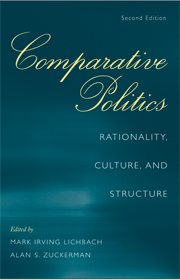Book contents
- Frontmatter
- Contents
- Contributors
- Preface and Acknowledgments
- 1 PARADIGMS AND PRAGMATISM
- 2 THINKING AND WORKING IN THE MIDST OF THINGS
- 3 ADVANCING EXPLANATION IN COMPARATIVE POLITICS
- 4 STRONG THEORY, COMPLEX HISTORY
- 5 RECONSIDERATIONS OF RATIONAL CHOICE IN COMPARATIVE AND HISTORICAL ANALYSIS
- 6 CULTURE IN COMPARATIVE POLITICAL ANALYSIS
- 7 RESEARCHING THE STATE
- 8 AN APPROACH TO COMPARATIVE ANALYSIS OR A SUBFIELD WITHIN A SUBFIELD?
- 9 THE GLOBAL CONTEXT OF COMPARATIVE POLITICS
- 10 COMPARATIVE PERSPECTIVES ON CONTENTIOUS POLITICS
- 11 CITIZENSHIP IN DEMOCRATIC POLITICS
- 12 NESTED CITIZENS
- 13 BACK TO THE FUTURE
- 14 THE COMPARATIVE POLITICAL ECONOMY OF THE WELFARE STATE
- 15 MAKING CAUSAL CLAIMS ABOUT THE EFFECT OF “ETHNICITY”
- References
- Author Index
- Subject Index
- Titles in the series
8 - AN APPROACH TO COMPARATIVE ANALYSIS OR A SUBFIELD WITHIN A SUBFIELD?
Political Economy
Published online by Cambridge University Press: 05 June 2012
- Frontmatter
- Contents
- Contributors
- Preface and Acknowledgments
- 1 PARADIGMS AND PRAGMATISM
- 2 THINKING AND WORKING IN THE MIDST OF THINGS
- 3 ADVANCING EXPLANATION IN COMPARATIVE POLITICS
- 4 STRONG THEORY, COMPLEX HISTORY
- 5 RECONSIDERATIONS OF RATIONAL CHOICE IN COMPARATIVE AND HISTORICAL ANALYSIS
- 6 CULTURE IN COMPARATIVE POLITICAL ANALYSIS
- 7 RESEARCHING THE STATE
- 8 AN APPROACH TO COMPARATIVE ANALYSIS OR A SUBFIELD WITHIN A SUBFIELD?
- 9 THE GLOBAL CONTEXT OF COMPARATIVE POLITICS
- 10 COMPARATIVE PERSPECTIVES ON CONTENTIOUS POLITICS
- 11 CITIZENSHIP IN DEMOCRATIC POLITICS
- 12 NESTED CITIZENS
- 13 BACK TO THE FUTURE
- 14 THE COMPARATIVE POLITICAL ECONOMY OF THE WELFARE STATE
- 15 MAKING CAUSAL CLAIMS ABOUT THE EFFECT OF “ETHNICITY”
- References
- Author Index
- Subject Index
- Titles in the series
Summary
INTRODUCTION – AND A FEW CAVEATS
The first edition of this volume featured a chapter on political economy by Peter A. Hall (Hall 1997). In it, Hall sought to define political economy by asking the following question: In the subset of those scholars who study the comparative politics of the advanced industrial states, how are political economy explanations constructed? Seen from this vantage, political economy, Hall answered, appears as a field defined by a specific set of concepts; interests, institutions, and ideas within comparative politics. Ten years later, I still find Hall's specification of the boundaries of the field, by reference to this troika of concepts, to be most useful for defining what political economy is and what it is not. However, in replicating Hall's analysis, two caveats are in order.
First of all, in following Hall's troika of “interests,” “institutions,” and “ideas” as defining political economy, I necessarily break with this volume's emphasis on “rationality,” “culture,” and “structure” as defining comparative politics. Why then do I prefer Hall's troika of boundary-setting concepts to the one offered by the editors? I do so since taking this route allows me to focus on interests rather than rationality as one of the three defining concepts of the subfield. This positioning is helpful, I suggest, insofar as while many political scientists see rational choice and political economy as synonymous (Weingast and Wittman 2006; Alt and Shepsle 1990), a focus on interests rather than rationality as a core concern allows me to place political economy in a broader frame that engages a more variegated set of literatures, particularly those on institutions and ideas, than would at first blush appear to constitute it.
- Type
- Chapter
- Information
- Comparative PoliticsRationality, Culture, and Structure, pp. 193 - 219Publisher: Cambridge University PressPrint publication year: 2009
- 10
- Cited by



